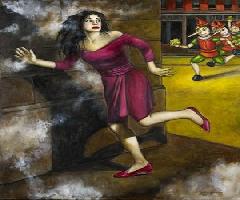Central delusion unworthiness
The central delusion of a person suffering from tormenting pangs of shame and conscience is: I am worthless or good for nothing, I am stool. Once while describing his self a sycotic patient said to me, “he is insect of the filth or stool”. This statement demonstrates that how shameful and worthless a sycotic person may feel of his self. The person enduring sycotic suffers from deep sense of inferiority complex. He compares himself to other well doing or well established people enjoying life to its brim and feels inferiors to them. A deep sense of inferiority is
implanted in his psyche which is not easily rooted. The sycotic shame is not an ordinary shame of some ordinary mistakes or crimes committed inadvertently in life but are of deep rooted and malignant type. There is persistent idea in the psyche of the victim that he or she has committed a crime that is unpardonable and he or she must be punished. Here the elder sister of shame, i.e. guilt conjoins it to make the things worse or unendowing. In many situations of psychosis both guilt and shame co-exist. These two emotions are fast friends that never leave each other or deceive each other. Our day today mistakes or wrong doings never generate shame or guilt but the sycotic background of the mentality can generate the feelings of shame and guilt at the minor talk or passing remark. The idea or notion so clings to the mind or is so fixed that it is not easy to shed this idea from consciousness. It haunts and haunts and torments the victim.Shame
To feel ashamed for one’s wrong doings is natural and healthy thing. Ordinary shame is healthy and corrects or modifies our behavior and makes us conscious of our wrong decisions and doings. Our moral standards or Norma tic metrics forbade us doing bad things. One should feel bad about smoking, stealing, drinking, lying or hurting someone’s feelings etc. But the real problem with sycotic mind is that it exaggerates the things and overwhelms the mind. The person starts feeling unloved, deserted, unworthy and dirty. He willfully exiled herself in isolation and melancholy. He starts so feeling so shameful about his wrong doings that he cannot endure to make an eye contact with the surrounding people. He
contracts his self like a tortoise in his own self. He starts hating himself and considers herself as an object of contempt of the people. These types of feelings of persecution are indeed the projection of her inner ugly and vulnerable self. His own self becomes dirty and filth and he perceives dirt particles touching his body.Delusion dirty he is
The second dominant delusion of a shameful person or personality is that he constantly feels of dirt or filth touching his hands or body. This is symbolic representation of his inner dirtiness and filthiness of mind as the sycotic mentality has penchant for mischief, illicit behavior and illicit behavior of promiscuity etc. He starts covering his face and hands in a bid to avoid contact with dust particles. “Always washing his hands” is the rubric that can be applied to this mentality. This speaks volumes of the fragile mentality of the victim. A deep dichotomy or contradictions is created in the self of the victim and he starts living his life on two parallel grounds. He starts pretending normalcy in the face of people and friends when actually; he internally always feels abnormality, chaos and confusion in mind. This paradox of life creates in him a great sense of isolation and ambivalent attitude of life in which he cannot decide on anything and his mind goes on hovering between two things “to be or not to be”
Shame and Psychotherapy
A psychologist Robert D. Caldwell wrote about the non-remedial nature of shame “Shame cannot be remedied; it must be somehow endured, absorbed, gilded, minimized or denied.” This statement though speaks about the cruel and stunning nature of shame but is only partially true. Shame can be cured with sessions of psychotherapy in which the victim is made deliberately consciousness of his repressed feelings in the unconscious and the situation from which he is fleeing. Shame can be cured permanently by judiciously selecting the simillimum medicine that displays the symptoms coinciding with the shameful psyche of the victim.
topichttp://homoeopathy.expertscolumn.com/article/homeopathic-treatment-guilt








